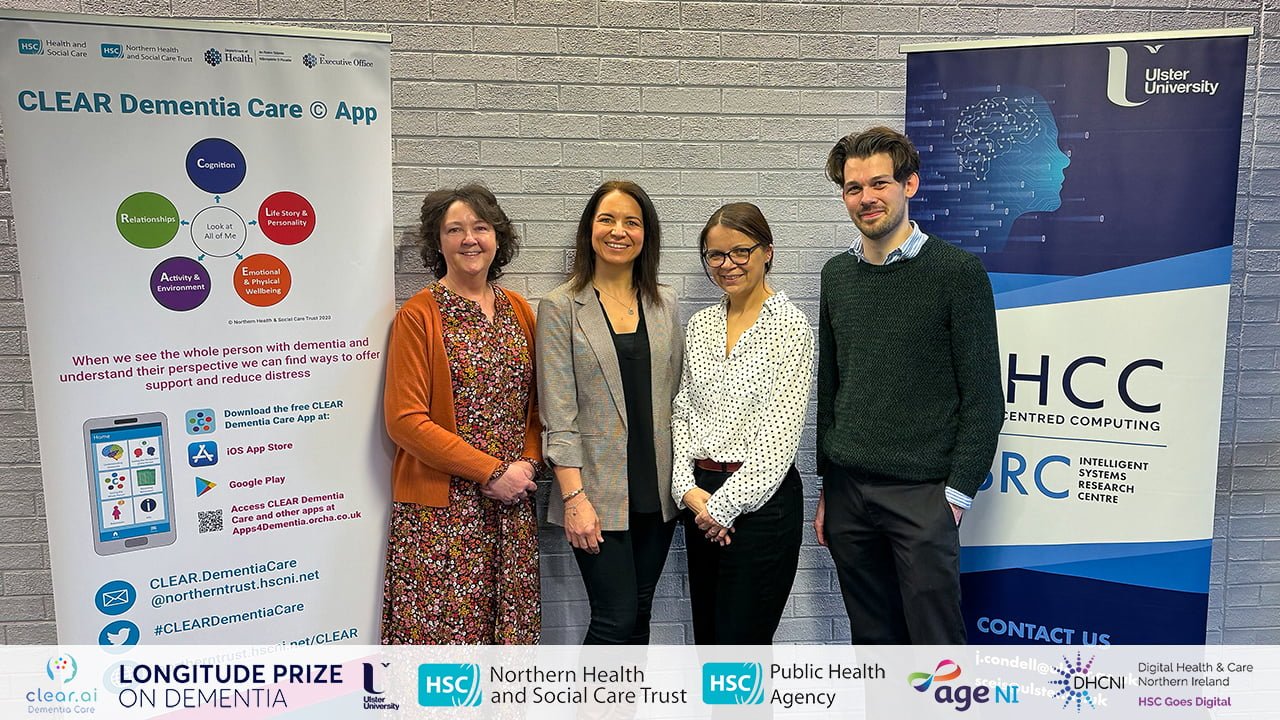Photo caption left to right: Dr Frances Duffy, Consultant Lead Clinical Psychologist, Impact Research Centre, Psychology of Older People Service, Northern Health and Social Care Trust (NHSCT); Dr Ruth Price, Research Fellow, School of Biomedical Sciences, Ulster University; Professor Joan Condell, Professor of Intelligent Technologies, School of Computing, Engineering and Intelligent Systems, Ulster University; Dr James Gillespie, Research Associate in Wearable Technologies, School of Computing, Engineering and Intelligent Systems, Ulster University.
Understanding and Addressing Changes in Behaviour
As dementia progresses it can be harder for the person to make sense of what is happening around them. This can increase confusion and be frightening. It also becomes more difficult for the person to meet their needs independently or to tell others what they want or need. This can lead to stress for both the person with dementia and those who offer care and support. Without realising, carers can sometimes respond in ways that increase distress.
When this happens, the person with dementia may present with behaviours such as aggression, pacing, vocalising, exit-seeking, and sexually inappropriate behaviour, which can be challenging for caregivers to understand. These behaviours present in up to 90% of people with dementia.
The CLEAR Dementia Care© approach, developed in the Northern Health and Social Care Trust, is implemented to help caregivers understand behaviour within the context of the person and their environment. By understanding how the person spends their day and identifying unmet needs, caregivers can respond effectively, reducing distress and, in turn, lessening the burden on caregivers and minimising the risk of the person with dementia transitioning to a care home.
The Clear.AI Project: Advancing Dementia Care through Technology
The Clear.AI project, funded by the Longitude Prize on Dementia, takes this innovative approach a step further. Its primary focus is to develop a comprehensive system for monitoring and analysing early signs of distress in people living with dementia and their caregivers. The project leverages wearable technology to collect physiological data along with monitoring the location of both the person with dementia and the caregiver within the home.
The goal is to create a holistic electronic record of daily activities and physiological responses, thus providing valuable insights into the onset and course of distress. Linda Robinson BEM, Chief Executive of Age NI welcomed the Clear.AI project as ground-breaking in its potential support for caregivers and people living with dementia.
By understanding the daily experiences of people with dementia, the project aims to harness these insights to build sophisticated machine learning models. These models will not only offer a deep understanding of the effectiveness of designed interventions but also highlight key factors contributing to increased distress. The ultimate goal is to enable the detection of early signs and deploy timely interventions before distress escalates, truly shaping the future of dementia care for people living with dementia and their caregivers.
Piloting the Future of Dementia Care
In December 2023, in collaboration with thriving.ai, we officially launched the pilot stage of the Clear.AI project with the onboarding of our first service user. The sensor system and mobile application, designed for physiological data collection, location monitoring, and daily activity tracking, is already yielding promising results.
Staying up to date
To stay informed about the progress of this trail-blazing research, be sure to subscribe to the ECHAlliance newsletter. We’ll regularly post updates on the pilot study and its outcomes, keeping you in the loop with the latest advancements in dementia care.
Discover more about Ulster University:
With a progressive approach to teaching, dedication to pushing research boundaries and strong commitment to economic development, Ulster University is a responsive, dynamic vibrant centre of learning. As a regional university, Ulster are uniquely placed to engage with communities, with local leaders and with imaginative partners who share ambitions for Northern Ireland and its young people. Our rich history spanning decades, coupled with our commitment to innovation and inclusivity, has positioned us as a leading global university.

